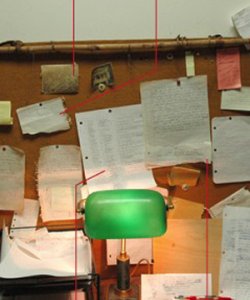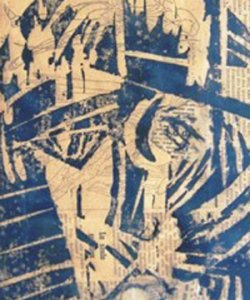John Casey's Writing Desk

Jump to navigation Skip to content
Articles from Poet & Writers Magazine include material from the print edition plus exclusive online-only material.
With so many good books being published every month, some literary titles worth exploring can get lost in the stacks. Page One offers the first lines of a dozen recently released books, including Leslie Marmon Silko's The Turquoise Ledge and Julia Franck's The Blindness of the Heart, as the starting point for a closer look at these new and noteworthy titles.
The Virginia Quarterly Review was rocked by the July 30 suicide of its managing editor, Kevin Morrissey, leaving the award-winning magazine’s future in doubt, as well as that of its editor.
Small Press Points highlights the happenings of the small press players. This issue features Sidebrow, the San Francisco–based independent press that publishes "works by multiple authors who aren’t timid about crossing genre boundaries."
A survey of professional opinions, including those of the New Yorker's Paul Muldoon and the Southern Review's Jeanne Leiby, about the Paris Review's decision to reject previously accepted poems.
The new Lit Mag Adoption Program is designed to introduce journals into creative writing course curricula and engage student writers as readers and members of a national literary community.
A look at the retro text editors and Web applications that more and more writers are using to roll back the reach of new media.

Portraits of Henry Miller “as a demon” and Guillaume Apollinaire, two of the thirty pieces featured in Beyond the Words: Author Portraits by Carl Köhler, currently on exhibit at the University of Chicago’s Joseph Regenstein Library.
Literary MagNet chronicles the start-ups and closures, successes and failures, anniversaries and accolades, changes of editorship and special issues—in short, the news and trends—of literary magazines in America. This issue's MagNet features Pleiades, Nashville Review, Sycamore Review, One Story, the Oxford American, the Awakenings Review, Fairy Tale Review, and Bound Off.

Staring down a disorder that prevents her from recognizing faces offers ample material for a memoir, but Heather Sellers tackles much more in You Don't Look Like Anyone I Know.

In the sixth installment of our series Inside Indie Bookstores, contributor Jeremiah Chamberlin travels to New York City to speak with Sarah McNally, owner of McNally Jackson Books.

Contributor Jeremiah Chamberlin profiles indie innovator Dzanc Books, which in four short years has gone from a start-up to a publisher with five imprints, three literary magazines, and a list of over fifty titles.

When is the best time in your career to look for representation, and when should you call off an author-agent relationship? Terra Chalberg, whose clients include Lori Ostlund and Glenn Taylor, tackles these questions and more.

American novelist Thomas Legendre, who has worked with British poet Matthew Welton to develop a new creative writing program at the University of Nottingham, speaks about what makes study in England unique and what writers can gain from attending the new graduate program.
In response to the Deep-water Horizon oil spill, writers Heidi Lynn Staples and Amy King created Poets for Living Waters, an online poetry forum featuring works written in response to the disaster, spurring a host of nationwide events that give poets not only an opportunity to take action against the catastrophe but also to speak out in support of our natural environment.

In the fifth installment of our series Inside Indie Bookstores, contributor Jeremiah Chamberlin travels to Denver to speak with Joyce Meskis, owner of Tattered Cover Book Store.
With so many good books being published every month, some literary titles worth exploring can get lost in the stacks. Page One offers the first lines of a dozen recently released books, including Paul Murray's Skippy Dies and Ai's No Surrender, as the starting point for a closer look at these new and noteworthy titles.
In June the San Francisco–based nonprofit Internet Archive partnered with several libraries across the country to allow e-book lending, taking the next step toward creating a one-stop online portal for digital reading and offering a hint of the new role libraries may play as the screen displaces the printed page.
Small Press Points highlights the happenings of the small press players. This issue features the new independent poetry press Birds, LLC, whose editors say an integral part of their mission is to build close relationships with authors and their work.
Literary MagNet chronicles the start-ups and closures, successes and failures, anniversaries and accolades, changes of editorship and special issues—in short, the news and trends—of literary magazines in America. This issue's MagNet features Upstreet, the Iowa Review, Fogged Clarity, jubilat, Granta, and Cellpoems.

A still from Howl, a new film centered on the drama of the obscenity trial brought against Lawrence Ferlinghetti of City Lights for publishing Allen Ginsberg's controversial poem, which is slated for release in New York City and Los Angeles on September 24.
In this regular feature, we offer a few suggestions for podcasts, smartphone apps, Web tools, newsletters, museum shows, and gallery openings: a medley of literary curiosities that you might enjoy.
A combination of hard data from programs that release funding and admissions figures to the public and a vital survey of what the individuals comprising the next generation of U.S. poets and writers have to say about their own priorities in choosing a postgraduate program, here is a ranking of the nation's top fifty MFA programs.
The top ten low-residency MFA programs in the United States, plus a ranking of the additional thirty-six low residencies in the United States and beyond.
Size, funding, cost of living—there's plenty to consider when choosing a postgraduate creative writing program. In our second annual ranking of the top fifty MFA programs, contributor Seth Abramson measures sixteen distinct program features for the 148 full-residency programs in the United States, Canada, and New Zealand, and eight features for each of the 46 low-residency programs around the world.